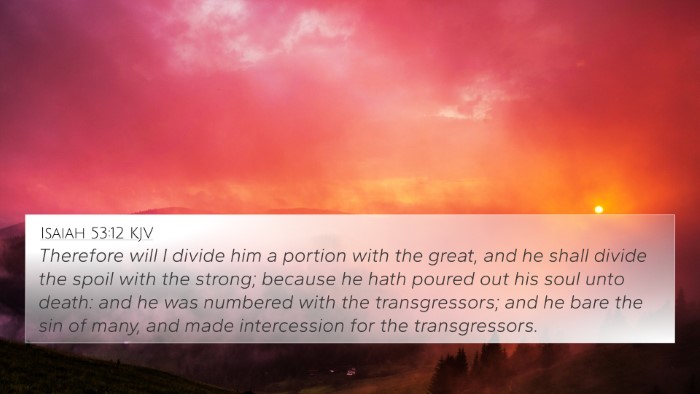Understanding John 3:30
Verse: "He must increase, but I must decrease." – John 3:30
This verse is a profound declaration by John the Baptist regarding the coming of Christ and the fulfillment of his own role as a forerunner to the Messiah. To fully grasp its meaning, we can explore interpretations from various public domain commentaries.
Insights from Commentaries
-
Matthew Henry:
Henry emphasizes the humility of John the Baptist in this statement. John recognizes that his ministry is to prepare the way for Jesus, and with Jesus' arrival, it is essential that John step back. This reflects a deep understanding of divine purpose; John's mission diminished so that Christ's mission could shine more brightly. Henry points out the importance of selflessness in ministry and the need to prioritize God's work above personal ambitions.
-
Albert Barnes:
Barnes elaborates on the contrast between the two figures—John and Jesus. He asserts that John’s decrease signals a transition from the old covenant to the new covenant established by Jesus. This transition was necessary for the fulfillment of the Scriptures and God's plan for salvation. Barnes also notes that true greatness comes from humility and the acknowledgment of Christ’s supremacy.
-
Adam Clarke:
Clarke interprets this verse as a declaration of the necessity of Christ's ministry. He highlights that John's role was always to decline in the face of Christ's glory. According to Clarke, this verse serves as a reminder to all believers about the essence of humility and the call to glorify Christ in our lives. Clarke's insights encourage believers to reflect on their own lives, asking how they can allow Christ to increase in their daily actions.
Thematic Connections
John 3:30 stands out as a pivotal moment that reflects the broader themes of humility, the transition from the old to the new, and the acknowledgment of Christ as central to Christian faith.
Related Bible Cross References
- Matthew 20:26-28: Jesus teaches about servanthood, reiterating the importance of humility and service.
- John 1:27: John the Baptist speaks of Christ and the need to acknowledge His greatness.
- Luke 9:23: Calls for self-denial to follow Christ, similarly reflecting the theme of decreasing self for Christ's sake.
- Philippians 2:5-7: Paul encourages believers to have the same mindset as Christ, who humbled Himself.
- John 3:16: Illustrates why Christ must increase—He is the Savior of the world.
- Mark 9:35: Jesus teaches that the greatest in the kingdom must be a servant of all.
- 1 Peter 5:5: Encourages believers to clothe themselves in humility toward one another.
- Colossians 3:2: Calls believers to set their minds on things above, aligning with the theme of prioritizing Christ.
- Galatians 2:20: Paul expresses the idea of living for Christ, emphasizing His increase in our lives.
- John 12:32: Jesus speaks of being lifted up, foreshadowing His glory and the calling of believers to recognize this increase.
Conclusion
In John 3:30, the profound truth of "He must increase, but I must decrease" speaks to the heart of Christian discipleship. It calls believers to live lives that glorify Christ above all, echoing the sentiments found in various scriptural texts. This verse challenges us to assess our own priorities and to embrace a life that sees Christ magnified, fostering a deeper understanding of interconnected biblical themes.
Tools for Bible Cross-Referencing
To further your study, consider utilizing tools and resources for effective Bible cross-referencing.
- Bible Concordance: A helpful tool to find words and themes throughout the Scriptures.
- Bible Cross-Reference Guide: Provides assistance in cross-referencing related verses.
- Cross-Reference Bible Study: Methods and materials for in-depth examination of biblical relationships.
- Bible Reference Resources: Various books and online tools available for cross-referencing.
- Comprehensive Bible Cross-Reference Materials: Offers extensive aid for deeper biblical studies.
Finding Cross-References
Understanding how to find cross-references in the Bible can enhance your study:
- Identify Connections: Look for thematic correlations in Old and New Testament texts.
- Comparative Study: Engage in detailed examination of Gospels and other writings to unveil common themes.
- Linking Scriptural Texts: Use study aids to connect verses that complement each other.
Further Reflections
As you ponder John 3:30, consider the call to humility in your own life. What areas require a focus on Christ's increase? Reflecting on these connections will deepen your understanding and appreciation of the biblical narrative.















